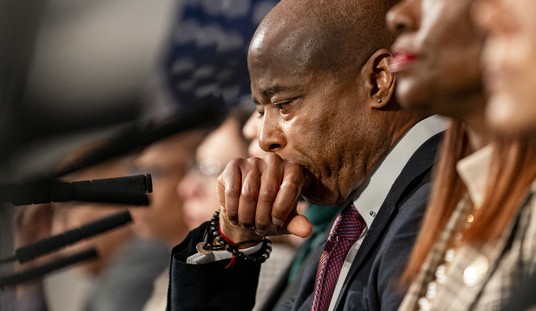As a society, we value nothing as highly today as we do displays of emotion and pique. For the aggrieved, fits and exhibitions are sufficient to both make and defend an argument.
But while emotional pageantry in lieu of a logical contention may yield spectacular results in the political realm, it remains insufficient in the eyes of those trained to argue the law. At least, that is the impression one gets from reading the reactions to this sloppy effort by a third year Harvard Law School student and an editor on the Harvard Law Review who recently argued in favor of delaying exams because of his perceived and vicarious emotional trauma.
“Our request for exam extensions is not being made from a position of weakness, but rather from one of strength and critical awareness,” wrote William Desmond in The National Law Journal.
What followed may be among the most ghastly prose and problematic structure a Harvard Law Review editor has published in quite some time. Desmond’s achievement is a feat that could only be accomplished by someone who has never been subject to much in the way of biting criticism.
“The hesitancy to recognize the validity of these psychic effects demonstrates that, in addition to conversations on race, gender and class, our nation is starving for a genuine discussion about mental health,” Desmond continued. “But to reduce our calls for exam extensions to mere cries for help exhibits a failure to understand the powerful images of die-ins and the booming chants of protestors disrupting the continuation of business as usual in cities across the country.”
You see, you simply fail to comprehend the impact of chants and reclining as expressions of civil disobedience. Their moral gravity eludes you.
Where some commentators see weakness or sensitivity, perhaps they should instead see strength—the strength to know when our cups of endurance have run over and when the time for patience has ended. Perhaps they should instead see courage—the courage to look our peers in the eyes and uncomfortably ask them to bear these burdens of racism and classism that we have together inherited from generations past. We have taken many exams before, but never have we done this. We are scared, but no longer will we be spectators to injustice.
“Cups of endurance?” Good lord. Do they runneth over into your “saucer of fortitude?” Mayhaps a few of those errant droplets are captured by your “doily of grit.”
Having exhausted his near limitless powers of metaphor, Desmond went on to chew the scenery in order to make his juvenile point.
“It is not that law students are incapable of handling their exams. It is that we are unwilling to remove ourselves, even for a few days, from this national conversation,” he asserted. “And by our analysis, responsible members of the legal community can no longer defend our criminal justice system as exemplifying fair process when that system so frequently produces the same unjust result—life drained from an unarmed black body by a barrage of government-issued bullets.”
Evocative imagery. The invocation of “government-issued bullets” is meant, one supposes, to convey the fact that we all are complicit in these exogenous events that have so deeply scarred our hero. Mistaking dramatics for depth is a common error, but it is also one more forgivable in a teenager steeped in 19th Century literature.
Desmond closes:
Our requests for exam extensions are requests for our faculties and administrations to recognize that this movement is our legal education—that when we march, when we advocate, when we demand accountability and action we are employing the analytical skills and legal knowledge that we have learned in our law school classrooms far more than we would be if we responded to a hypothetical exam prompt.
While you’re surely now weeping over our country’s bleak future, don’t draw that warm bath yet. The public response to Desmond’s twaddle has been heartening:
For the record, no, I don't see strength. I see a lot of self-indulgent, exploit others' pain for personal gain BS. http://t.co/M3dkAjEZdh
— Liz Mair (@LizMair) December 16, 2014
Someday this poor guy will reread this and weep with embarrassment. http://t.co/F4ICkLfri9
— Brit Hume (@brithume) December 16, 2014
BREAKING: Special, delicate snowflake wants you to stop laughing at him.
http://t.co/jEGvENi2YH
Via @lachlan
— Drew M. (@DrewMTips) December 15, 2014
Things millennials say:
1) College is too expensive!
2) Attending a protest is more educational than taking an exam. http://t.co/YSiemRPwfC
— Andrew Stiles (@AndrewStilesUSA) December 15, 2014
God. At the age of this Harvard Law Review editor, my grandfather was a Marine, storming Saipan. http://t.co/KTkonQnmL6 … via @lachlan
— Popehat (@Popehat) December 15, 2014
Apparently the ability to write coherently is not a prerequisite for Harvard Law Review editing gigs http://t.co/LbRiAfctcz
— Lachlan Markay (@lachlan) December 15, 2014
Surely, the sweetest justice that could emerge from Desmond’s plaintive op-ed is for him to see that he has set his cause back significantly. The only valuable lesson that a law student could learn from this episode would be that making flawed and unconvincing arguments (not to mention employing laughably tortured metaphors) has consequences. To even condescendingly congratulate Desmond on his failed but noble effort would be a lie. Decency demands that this argument be rejected in whole, and its author shamed for crafting an ersatz intellectual argument around lethargy.
Given the harsh response Desmond’s case has prompted in the real world, that outcome seems possible. But who knows? Harvard Law is clearly nothing like the world outside.








Join the conversation as a VIP Member